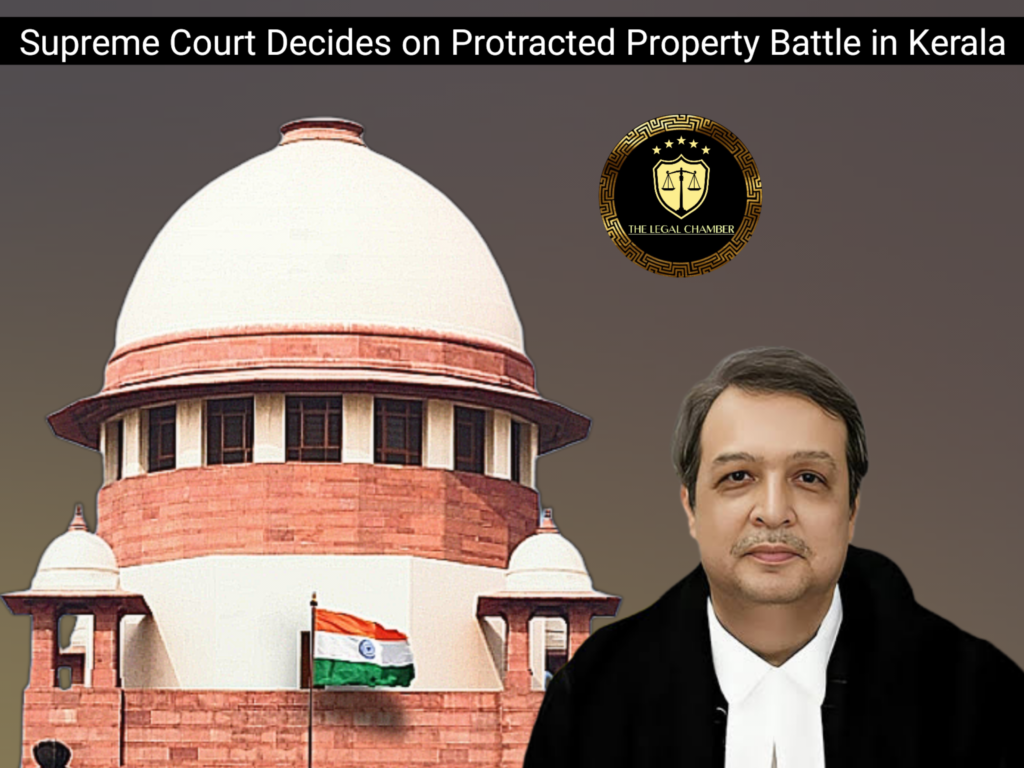
The Supreme Court dismissed an appeal challenging the impleadment of a party in execution proceedings, holding that the application for deletion was barred by res judicata as objections were not raised earlier. It ruled that a decree for specific performance implicitly includes possession unless contested by a third party. The Court rejected claims of tenancy rights under the Kerala Rent Control Act due to lack of evidence and upheld the lower courts’ findings, emphasizing that frivolous pleas cannot delay execution. Costs of ₹25,000 were imposed for protracting litigation. The Executing Court was directed to ensure possession is handed over within two months
Facts Of The Case:
The case originated from a 1996 agreement to sell between the original plaintiff (Prakasan) and defendant (Jameela Beevi) for a property in Palakkad, Kerala. The plaintiff filed a suit for specific performance after the defendant failed to execute the sale deed. The trial court decreed the suit in 1998, but the defendant challenged it, leading to a protracted litigation spanning over two decades. After multiple appeals, the Supreme Court upheld the decree in 2008.During execution proceedings, Jameela Beevi died, and her legal heirs, including her grandson (appellant Sulthan Said Ibrahim), were impleaded. The appellant initially remained silent but later filed an application in 2012, claiming he was not a legal heir and asserting tenancy rights inherited from his father. Both the trial court and High Court rejected his plea, holding it was barred by res judicata and an attempt to delay execution.The Supreme Court upheld the dismissal, noting the appellant’s belated objections and lack of evidence supporting his tenancy claim. It ruled that a decree for specific performance inherently includes possession unless a third party’s rights are proven. The Court imposed costs of ₹25,000 for frivolous litigation and directed the executing court to ensure possession is handed over within two months, ending the 25-year legal battle.
Procedural History:
The case of Sulthan Said Ibrahim v. Prakasan & Ors. originated in O.S. No. 617 of 1996 for specific performance. Initially decreed ex parte in 1998, the suit was restored and re-decreed in 2003. This decree achieved finality after affirmations by both the High Court and Supreme Court in 2008. Execution proceedings began in 2003. After the original defendant’s demise in 2008, the appellant was impleaded as a legal heir. His subsequent objections and a Section 28 application were dismissed by the Trial Court and upheld by the High Court by 2012. In 2012, the appellant sought to be removed from the case, claiming improper impleadment and tenancy rights. This application was dismissed by the Trial Court in 2013 and affirmed by the High Court in 2021, citing valid impleadment and res judicata. This lengthy procedural history culminated in the present Supreme Court appeal, which was also dismissed, despite a sale deed being executed in 2022, with possession yet to be granted.
READ ALSO :Judicial Service Reinstatement: Supreme Court Rules Against “Minor Irregularity” Discharge
Court Observation:
In this case, the Supreme Court made several critical observations. Primarily, the Court repeatedly noted that the appellant’s various applications, particularly the one seeking deletion from the array of parties, were nothing but calculated attempts to unduly delay the execution of a decree that had attained finality. The Court emphasized the principle of res judicata, asserting that the order impleading the appellant as a legal heir had become conclusive as it was never challenged. Furthermore, the Court deemed the appellant’s claim of tenancy rights to be an “after-thought” and entirely without merit, pointing out the lack of any substantiating evidence and the inconsistent nature of his arguments over the prolonged litigation. The Court also underscored that the executing court has a duty to ensure the timely and effective implementation of decrees, expressing concern over the inordinate delay. Consequently, the Supreme Court directed the immediate handover of vacant and peaceful possession of the property to the respondent, even authorizing police aid if necessary, and imposed costs on the appellant for the frivolous nature of his appeal.
Final Decision & Judgement:
In its final decision, the Supreme Court concurred with the rulings of both the High Court and the Trial Court, finding no errors in their judgments. Consequently, the appeal filed by Sulthan Said Ibrahim was dismissed. The Court imposed costs of ₹25,000/- on the appellant, to be deposited with the Supreme Court Legal Services Committee within two weeks. Crucially, given that the sale deed for the property had already been executed in favor of the original plaintiff (respondent no. 1), the Supreme Court directed the Executing Court to ensure that vacant and peaceful possession of the suit property is handed over to the respondent within a strict period of two months, authorizing the use of police aid if necessary to facilitate this process.
Case Details:
Case Title: Sulthan Said Ibrahim versus Prakasan & Ors. Citation: 2025 INSC 764 Appeal Number: Civil Appeal No. 7108 of 2025 Date of Judgment: 2025 Judge/Justice Name: J. B. Pardiwala
Download The Judgement Here